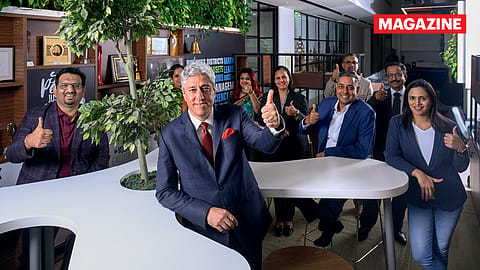Chalet Hotels and its future-ready mantra: How its employees' well-being is important for the company
Chalet Hotels’ future-ready mantra rests on the pillars of meritocracy, empowerment, and sustainability.

This story belongs to the Fortune India Magazine March 2025 issue.
OFFERING PERSONALISED SERVICES, knowing the food preference of guests, and paying attention to their minutest likes and dislikes are considered the hallmarks of a great hospitality brand. Sanjay Sethi, MD & CEO, Chalet Hotels, believes in creating a similar endearing culture within the organisation for his employees. “We have made sure we have an environment that fosters collaboration and ensures that our people are really happy with what they do,” he says.
This culture has helped Chalet Hotels secure the fourth position in Fortune India’s Future-ready Workplaces Study this year.
Sethi’s mantra is to make sure every employee feels important, a trait he picked up early in his career. He was in the final year of his hospitality management course when he was sent for his four-week industrial exposure training to The Taj Mahal Hotel in Delhi. Trainees, he says, are made to do unglamourous tasks such as moving furniture or setting up buffets at the coffee shop. Sethi’s life was no different. But, at the end of his training, the then manager of the hotel’s coffee shop, Bobby Saxena, asked him to show his report. “I met him at the coffee shop, and he insisted that I order something so that he could go through my report. He carefully read through my report and gave me his feedback. I never met Bobby again in my career, but the one learning I took back from that meeting was to value every employee… as an important part of the organisation. It’s only if they are given the attention due will they give their best to the organisation.”
The ₹1,417-odd crore K. Raheja Group company develops and manages hotels of popular hospitality chains such as Marriott International and The Accor. Its portfolio comprises 11 fully operational hotels representing 3,193 keys, across mainstream and luxury segments, and commercial spaces representing 2.4 million sq. ft in close proximity to the hospitality assets. Though the international brands are the face of the hotels, Chalet has a say in talent recruitment and management since the employees are on its rolls.
Sethi takes pride in having built a meritocracy-led culture in the 10 years he has been at the helm. “Earlier, there was formality in hierarchy... I told my colleagues that hierarchy is a necessary evil to give an organisation a structure for the decision-making process and beyond that it serves very little,” he says, adding that the culture they have created is to stay current with what is happening with the market and in the workplace. So, the first thing that he did was to make sure that promotions were given on merit and not based on the number of years spent in the company.
“We created a culture that is merit-based, that fostered collaboration and a thought process which at every given year was reviewed and we adapted a change if it was required,” he explains. This, he claims, made the organisation more attractive to the millennials and GenZ. Also, getting this demographic into the workforce became important, as they were becoming the primary target audience for the business.
Over 90% of Chalet employees are millennials and GenZ, and this is a generation obsessed about doing business the right way. Sethi claims half the battle is won when he tells aspiring hotel management professionals on campus that all the hotels that Chalet develops are climate positive, 24% of its workforce are women, and over 60% of leadership roles have women at the helm.
More Stories from this Issue
Sethi agrees that the organisation could do better in terms of its overall percentage of gender diversity, but, he says that it is making the right moves. “Our industry operates at 11-12% and we were at 13% six years ago. Today we are at 24%,” he says. The company’s aha moment was the launch of a 168-room, all-women Westin hotel in Hyderabad, in 2023. “When the hotel was to be opened in 15 months, I said we should have an all-women-run hotel. My operations head spoke to Mariott which was going to run it, and they were excited.”
However, getting talent for roles in engineering and security wasn’t easy, as there was no experienced talent available. “We hired girls studying electrical and civil engineering from the local ITI, trained them in our other hotels and six to eight months later, they were commissioned at this hotel.” The all-women hotel is the only one of its kind in the world, says, Sethi.
The hospitality industry is all about human capital and Sethi firmly believes that to be future-ready, it is crucial to create a talent pool that is happy to give its very best to the organisation.